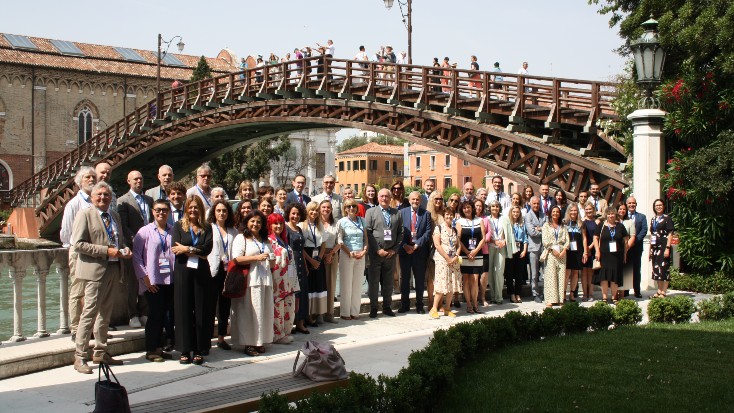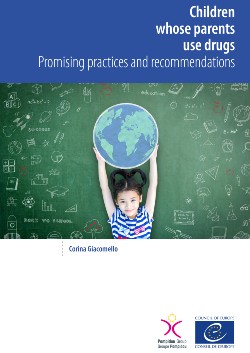
OUR PRIORITIES IN 2024
2023 has been a year of major developments for both the Council of Europe and its Pompidou Group. At Council of Europe level, the 4th Summit of Heads of State and Government, held in Reykjavik on 16-17 May 2023, has demonstrated Europe's unity in front of Russia's aggression war against Ukraine, and set up a renewed political and strategic agenda for the Organization and its 46 members.
As a follow up to the Summit priorities, the Pompidou Group is developing policy guidelines in the fields of online addictions and of human rights and drug policies, with the objective of preparing two draft Committee of Ministers Recommendations, in cooperation with the Steering Committees on Media and Information Society (CDMSI) and on Human Rights (CDDH) respectively. It also launched a project to create an online course on criminal justice and community responses to drug use and addictions under the Council of Europe HELP programme.
As regards the support to Ukraine, which joined the Pompidou Group in January 2022, continued efforts are being made to integrate all relevant authorities and interlocutors (including civil society) within the Group’s activities, despite the war circumstances. In addition, a specific cooperation programme has been set up (and is being implemented) to support the introduction of Opiod Agonist Treatment (OAT) in Ukrainian prisons and pre-trial detention and to establish a therapeutic community for treating substance disorders in the Odessa prison, based on the successful experience carried out in the Pruncul prison next to Chisinau (Moldova) since 2018. Last but not least, the Pompidou Group is providing legal expertise on a draft law on rehabilitation under discussion within the Verkhovna Rada, in terms of its compliance with CoE human rights standards.
Furthermore, during this second year of the Italian Presidency, the Pompidou Group will continue to implement the 2023-2025 work programme adopted at the Lisbon ministerial Conference in December 2022, building on the related priorities set up by the Presidency in January 2023. In particular:
- after the successful first edition which took place in Strasbourg in December 2023, a second annual conference on drug control networks will be organized in the Autumn;
- a wide range of activities will continue to be implemented within the two PG regional networks in South-East Europe and the Mediterranean; this latter which will continue to benefit from the renewed financial support of France and Italy, the Joint Council of Europe and EU South Programme V and the Council of Europe Tunisian Action plan;
- a new session under the PG Thematic Training programme will be organized on the topic ‘Improving Access and Quality of Treatment Services’;
- work will be pursued on redefining the role of police in drug prevention, elaborating guidance on evaluating their contribution to drug prevention and a competency framework for officers;
- a joint conference on improvement and safeguards of health conditions of persons deprived of their liberty with substance use disorders will be co-organised in the Autumn with the European National Preventive Mechanisms Forum;
- the work on children and families by parental drug use which started in 2020 and which is now part of the 2023-2025 work programme and which will develop in 2024 guidelines for the development and consolidation of comprehensive services for children and families affected by substance dependence;
- a follow-up to the project successfully implemented in Georgia in the field of prevention over the last 18 months will be included in the new Council of Europe action plan for Georgia 2024-2026;
- last but not least, the Pompidou Group will actively participate in two major international events: the 67th CND session in Vienna in March and the 5th edition of "Lisbon addictions" in October.
Children Whose Parents Use Drugs – Promising practices and recommendations
This publication sheds light on an invisible population: children and adolescents living in families where at least one parent uses drugs. This focus on children exposed to parental dependence on drugs and alcohol implies helping them and their families to overcome dependence and its consequences. Parental drug use impacts children at every stage of their lives, from before birth and well into their adult lives. However, until now, this situation has received very little attention. The publication looks at children growing up in families affected by drug and alcohol dependence, as well as the services, programmes and practices that help protect childhood and ensure children’s needs are met, while at the same time addressing the needs of parents.
The content, conclusions and recommendations presented in the publication intend to contribute to increasing knowledge base and interest in the topic and serve as a practical reference for the identification of promising practices and international partners to address it. It includes 29 experiences and practices from governmental or non-governmental bodies, divided by main area of intervention and country. This has been possible thanks to the participation of 102 people in different activities.
Far from being a conclusion, this publication is the first step in an ongoing joint effort to give visibility to children of parents who use drugs and a tool to foster cooperation and dialogue between governmental and non-governmental actors.




